book review
mio
Though written several years after Alice's Adventures in Wonderland,
Through the Looking-Glass picks up a mere six months after Alice's first
experience in a nonsensical, dreamlike world. Now "seven and a
half, exactly." Alice falls asleep one November day while playing
with her kittens, climbs through the mirror over the fireplace, and
finds herself in Looking-glass House and the giant chessboard
surrounding it. Once Alice gets her bearings and joins the chess
game-first as a pawn, but with the goal of becoming a queen-she
symbolically starts to come of age and eventually reaches a version of
adulthood when she's crowned queen. However, Alice's journey makes it
clear that navigating childhood on the way to adulthood is a lonely
process, and the end goal-adulthood-is, at best, a questionable one.
Because Through the Looking-Glass is seven-and-a-half-year-old Alice's
dream, it's possible to read Alice's struggles and anxieties in
Looking-glass World as reflections of her anxieties about growing up in
the real world. In many cases, Through the Looking-Glass suggests that
being a child and growing up are lonely states of being. The novel opens
with Alice talking to her cats, Dinah, Kitty, and Snowdrop. While the
narrator mentions Alice's sister at several points in passing, Alice
appears to be very much alone with the cats and, eventually, with the
beings that spring into existence in her mind. Even when Alice does find
herself in the company of other people, she remains lonely: in
Looking-glass World, Alice feels unable to voice many of her thoughts to
others in an attempt to remain polite and in others' good graces. The
reader, for instance, is the only one privy to the fact that figuring
out how to shake hands with Tweedledee and Tweedledum is an intensely
difficult experience: what if she offends one by shaking the other's
hand first? Even characters who insist they're there to help her, like
the Gnat or the White Knight, don't provide much support and Alice is
still effectively left to her own devices to navigate the chessboard and
the larger project of growing up. The novel also suggests that
reckoning with one's rapidly changing identity is a key part of growing
up, even (or especially) when others aren't much help in this process.
At several points, Alice has to think critically about who she is and,
more broadly, what the names of things are even for. When Alice and the
Gnat discuss the names of different insects, the Gnat demands to know
whether the insects in Alice's world respond to their names. Upon
learning that they don't, the Gnat is shocked. Alice, however, suggests
that there's more to a name than referring to an individual: a name, she
proposes, will help others figure out who or what something is. With
this, the novel suggests that identity goes two ways: it's both
something personal to an individual, and it helps other people fit that
individual into their conception of the world. Similarly, Humpty Dumpty
is derisive when he learns Alice's name: in addition to declaring it
"stupid," he suggests that names must mean something.
According to Humpty Dumpty, his name refers to his shape, while
"With a name like [Alice], [she] might be any shape, almost."
To him, "Alice" tells him nothing about who the child in front
of him is. This episode in particular (especially when considered
alongside Alice's experience in a wood in which travelers forget all
nouns, including their names) suggests that childhood is a state of
potential. A child can grow up to be anything or anyone, but the novel
also suggests that the results of this potential aren't always positive.
After Alice leaves the wood, for instance, the Fawn who helped her
heartbreakingly remembers its own identity, and consequently that it's
supposed to be scared of humans like Alice. The Fawn's experience of
learning its name leads to fear and isolation, a turn of events that
foreshadows Alice's unsatisfying reign as queen at the end of the novel.
For both Alice and the Fawn, remembering their names represents a form
of self-knowledge-but in this case, that self-knowledge closes doors,
rather than opening them or giving Alice more power to interpret or move
through Looking-glass World. Though Alice wants to be a queen
throughout the novel, actually becoming a queen is far less rewarding
than she likely anticipated. Upon crossing into the Eighth Square, Alice
discovers that there's a crown on her head, signifying her royalty—but
it's not comfortable, and Alice struggles to figure out how to move and
balance with it. Further, Alice is denied all the food at a dinner party
in her honor, and the party itself takes place under questionable
circumstances: the Red Queen and the White Queen both insist that Alice
is the one throwing the party, while Alice, upon arriving at the
location of the party, can barely figure out how to get into the
building. Taking the party as a metaphor for adulthood, Alice's
experience suggests that while adulthood may look desirable to children,
and while childhood may simultaneously seem anxiety-inducing and
difficult, being a child might be better on a whole: upon waking, Alice
happily resumes chatting to her cats with wonder and nostalgia about her
time in Looking-glass World. With this, Carroll seems to suggest that
part of the joy of being a child is dreaming about what adulthood might
be like, without having to actually tackle the hardships and
difficulties that come with the territory. Similarly, adults would do
well to take adulthood less seriously and remember the joys of childhood
at every opportunity.





 京公网安备 11010802032529号
京公网安备 11010802032529号